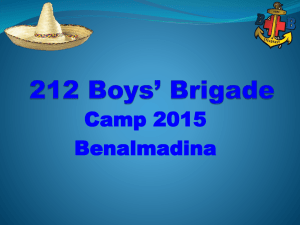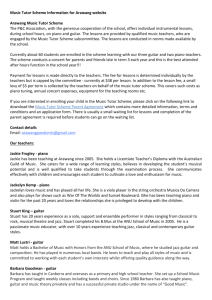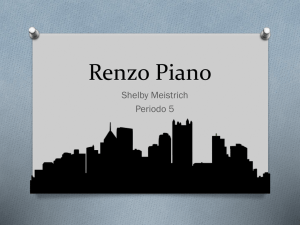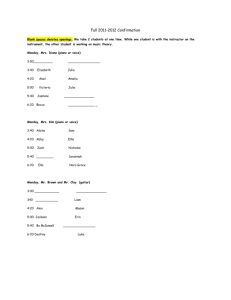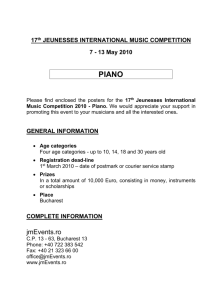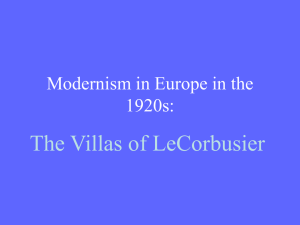SARAH DONALDSON - the Benjamin T. Rome School of Music!
advertisement
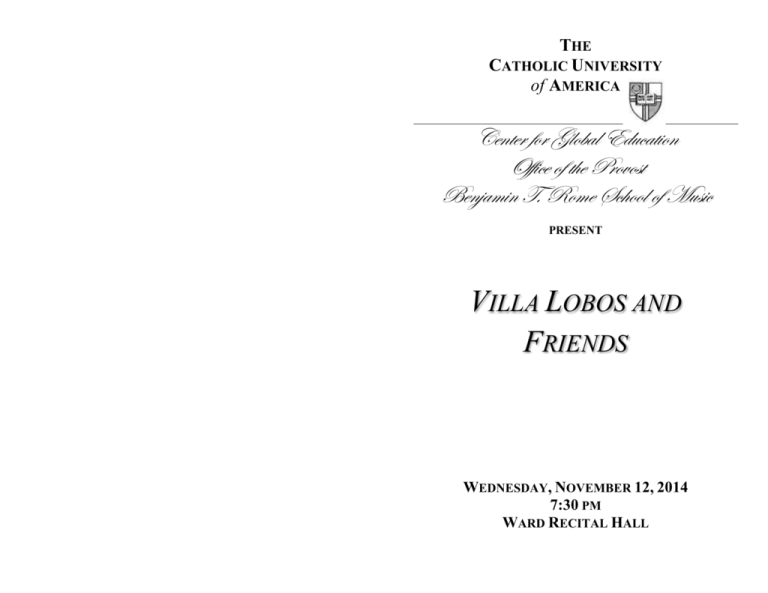
THE CATHOLIC UNIVERSITY of AMERICA Center for Global Education Office of the Provost Benjamin T. Rome School of Music PRESENT VILLA LOBOS AND FRIENDS WEDNESDAY, NOVEMBER 12, 2014 7:30 PM WARD RECITAL HALL Please join us for upcoming performances of The Catholic University of America’s Benjamin T. Rome School of Music: THE WASHINGTON INTERNATIONAL PIANO SERIES AT CUA www.washingtonpianofest.com COMPOSITION PROGRAM RECITAL November 14, 2014 7:30 PM John Paul Hall CUA Opera Theater presents SUSANNAH November 20-22, 7:30 PM November 23, 2:00 PM Ward Recital Hall ANNUAL CHRISTMAS CONCERT FOR CHARITY CUA Chamber Choir CUA University Singers CUA University Chorus CUA Symphony Orchestra December 5th, 2014 7:30 pm Basilica of the Shrine of the Immaculate Conception WOMEN'S CHORUS CONCERT December 6, 2014 7:30 PM St. Vincent de Paul Chapel CUA WIND ENSEMBLE CONCERT December 3, 2014, 7:30PM Hartke Theatre For more information, visit http://music.cua.edu/, find us on Facebook, or call 202-319-5416 For more information regarding the 50th anniversary of the School of Music, visit our website, http://music.cua.edu. Rodrigo Vasco is having fun playing new music for new people. Born in Medellin, Colombia, Rodrigo is a Fullbright second year graduate student in the Doctor of Musical Arts program at the Benjamin T. Rome School of Music, Catholic University of America. A student of José Ramos Santana, he has a Bachelor in Piano Performance from the Universidad de Antioquia and a Masters degree in Music Performance from the Universidad EAFIT. Rodrigo is also pursuing a Latin American Music minor and doing research in Piano Performance from a Pan American perspective. Dr. Ortiz Welcome page Welcome from the Dean Welcome to all our guests for this performance of music from Brazil. The Benjamin T. Rome School of Music has been dedicated for over three decades to honoring the rich traditions of Latin American music. Our Latin American Center for the Graduate Study of Music was founded by the late Dr. Emma Garmendia and the eminent late Dr. Robert Stevenson, perhaps the greatest expert of the last fifty years in the study of Latin American music. Our students have come from throughout the Americas; including a number of former students from Brazil who now teach and perform internationally. In 2015, the School of Music will celebrate the fiftieth anniversary of our creation as a distinct school of Catholic University, a celebration that will include a major US premier of works written and performed in the missions of Bolivia. As part of this anniversary, we continue this dedication to the remarkable music of Latin America. Being one of the most important centers for such study in the US, our school takes pride in our contributions to the performance, preservation, and research on music from the Caribbean, Mexico, Central and South America. G. Grayson Wagstaff, Ph.D Dean and Professor of Musicology The Benjamin T. Rome School of Music Madama Butterfly. She has also reprised the role of Juliette in the Bel Cantanti production of Romeo and Juliette. João Paulo Figueirôa is recognized today as one of the most influential classical guitar players from Brazil. He has performed throughout the United States and South America, including appearances at the Kennedy Center and Sal do Coro do Teatro Castro Alves. An enthusiast of contemporary music, he has premiered new works by composers such as Paulo Costa Lima and Leonardo Boccia. Among his many awards are first prize at the Fourth Annual Musicalis National Competition in 2000, winner of the 2nd Orquestra Sinfonica da Bahia Young Soloists Competition in 2003 and first prize winner at the Columbus State Guitar Symposium in 2007. In addition to his performing career, João Paulo is in demand as a teacher. Currently he serves as a professor of guitar studies at Catholic University of America. He also contributes to many cultural projects with the Embassy of Brazil and serves as Education and Outreach Coordinator for the Marlow Guitar Series. João Paulo earned his master and doctoral degrees in music from The Florida State University. Prior to his studies in the United States, João Paulo studied at the Universidade Federal da Bahia where he earned a bachelor degree and pre-college artist diploma in music. João Paulo performs on guitars made by Brazilian guitar maker Samuel Carvalho. José Ramos Santana, a native of Puerto Rico, is one of the most acclaimed pianists of his generation. He performs a wide and diverse repertoire while being an acknowledged master of Spanish Music. Mr. Ramos Santana has appeared as a guest soloist with such major orchestras as the New York Philharmonic, Royal Philharmonic Orchestra of London, Detroit Symphony, Saint Louis Symphony, Baltimore Symphony, 92nd Street Y Orchestra, Casals Festival Orchestra, and Puerto Rico Symphony among others. He has collaborated with distinguished musicians and conductors such as Krsztoff Penderecki, John Adams, Dennis Russell Davies, cellist Arto Noras, violinist Gregory Zhislin, and pianist Vladimir Viardo. He has also performed at Carnegie Hall with the American Composers Orchestra during the Sonidos de las Americas Festival. In addition, José Ramos Santana has also performed at Zankel and the Weill Recital Hall under the auspices of La Gesse Foundation. His world premiere recording of "Glosas" by Roberto Sierra with the Royal PhilharmonicOrchestra on the Fleur de Son Label received critical acclaim. Other works included on this CD are Ravel's Piano Concerto in G and SaintSaens Piano Concerto in g minor, op. 22. Mr. Ramos Santana has recently recorded the complete works for piano and violin by the Catalonian composer Xavier Montsalvatge with violinist Eva León on the Naxos Label. Mr. Ramos Santana is a graduate of the Juilliard School where he studied with Adele Marcus, William Masselos and Sylvia Rabinoff. He has also coached with Leon Fleisher and Alicia de Larrocha. He is a member of the Piano faculty at The Benjamin T. Rome School of Music, Catholic University of America. Heitor Villa Lobos (1887-1959) was the leader of the nationalistic movement in Brazil. He did not copy the style of other composers but preferred to blend Brazil's native music with European influences and his own imagination. Primarily self taught, after a short period of musical study, he traveled throughout Brazil learning the indigenous music and folklore of his native country. In 1920 he visited Paris where he absorbed the music of Debussy and D'Indy. His music covers a wide variety of styles from the European music traditions to the folk and popular music of Brazil. He mastered both the guitar and the cello and both instruments figure prominently in his music. Villa Lobos was the first Latin American composer to achieve international fame as a modernist. His music is characterized by vitality and color, integrating the diverse variety of Brazil's geographical areas and cultures into a distinct musical language that captures the country's essence. He said: "It is only nature and humanity that can lead an artist to the truth. I study the history, the country, the speech, the customs, the background of the people. I have always done this, and it is from these sources, spiritual as well as practical that I have drawn my art." Ernani Braga (1868-1945) went to Paris in 1890 on a fellowship and studied for a time with the French composer Massenet. He later traveled to Germany where he was influenced by Richard Wagner. While in Europe he also traveled to Italy where he composed an opera. He returned to Brazil in 1900 where he was influential in the musical life of both Rio de Janeiro and São Paolo as composer, conductor and professor of composition. Braga was the teacher of Villa Lobos and together their style of composition integrated the European music tradition with the rhythms of Brazil. His skill in combining speech rhythms into his essentially lyric style makes his songs fascinating and appealing. Jayme Ovalle (1994-1955) was a friend of Heitor Villa Lobos. Ovalle drew upon his native musical traditions, writing artful folk song arrangements as well as original songs. Performers Chun-Ting Chao originally from Taiwan, is a graduate vocal performance student in the Doctor of Musical Arts program at the Benjamin T. Rome School of Music at the Catholic University of America. Chun-Ting realized at age eleven that singing made her special and at age fifteen decided to become a professional singer. She worked very hard and dedicated herself to becoming the best vocal student in Taiwan. In 2007, she competed against singers from all over Taiwan and emerged as the winner in the Association of Vocal Arts in Taiwan's Young Artist competition. She continued her studies in the United States, receiving the Peabody Institute's Graduate Performance Diploma in Voice. Ms. Chao has performed the role of Orlinde in Wagner's Die Walkiire produced by the National Symphony Orchestra of Taiwan. At the Catholic University of America she has performed Donna Anna in Mozart's Don Giovanni, Juliette in Gounod's Romeo et Juliette and Cio Cio San in Puccini's VILLA LOBOS AND FRIENDS PROGRAM Água e Vinho Loro Egberto Gismonti (1947 -) Aquarelle Divertimento Valsena Preludio e Toccatina Sérgio Assad (1952 -) João Paulo Figueirôa, Guitar Impressões Seresteiras Heitor Villa Lobos (1887-1959) José Ramos Santana, Piano Veleiro Melodia Sentimental Heitor Villa Lobos (1887-1959) Capim di pranta Ernani Braga (1868-1945) Azulao Jayme Ovalle (1894-1955) Chun-Ting Chao, Soprano José Ramos Santana, Piano Bachiana Brasileira No. 4 Prelúdio (lntrodução - 1941) Coral (Canto do Sertão - 1941) Aria (Cantiga - 1935) Dança (Miudinho - 1930) Heitor Villa Lobos Rodrigo Vasco, Piano Program Notes Água e Vinho by Egberto Gismondi translates as Water and Wine and features a very contemplative melody. Loro means Parrot and is a very lively and outgoing piece based on the Brazilian rhythm called Baiäo. Aquarelle was the first piece composed for solo guitar by Sergio Assad and was dedicated to the Scottish guitarist, David Russell. It has become Assad's best known work. The first movement, Divertimento, is based on the Brazilian Marcha - Rancho Rhythm. The second movement, Valsena, composed earlier, is a melodic and well balanced piece which provides a contrast between movements. The third movement Preludio e Toccatina contains a brief prelude where Assad inverts the main motif that had been presented in the first movement. The toccatina that follows is very difficult and highly contrapuntal. Impressões seresteiras (Impressions of a Minstrel) for piano was composed in 1936 by Heitor Villa Lobos and is part of the "Brazilian Cycle" which is made up of four movements: Plantio do caboclo (The Peasant's Sowing) Impressões seresteiras (Impressions of a Minstrel) Festa no sertao (The Fete in the Desert) Danca do Indio Branco (Dance of the White Indian) Song of the Amazon Forest is a song cycle of four songs from the symphonic poem "Forest of the Amazon". The poems of the songs were written by the poet Dora Vasconcellos, a friend of Villa Lobos. The songs in the cycle are: Veleiros (Sails), Cair de Tarde (Twilight), Cançao de Amor (Song of Love) and Melodia Sentimental (Sentimental Melody) Veleiros Sails on the sea, released by the blue twilight Which other waves come to remove in the murmurs of a sad love, Sweet sorrow always exists. Ah! Waves of the sea in your coming and going, you do not remove my sadness After having given so much attention not to hurt your heart, Ah! Far away in the sky comes the wave to throw away all that is mine into the sea, all my hope. Little white moon, crescent moon, come slowly, Ah! Melodia Sentimental Wake up, come see the moon that sleeps in the dark night Shining so beautifully and white, shedding sweetness, Clearly calling forth my dreamy silent ardor The wings of night that flee, running off into deep space, Oh sweet beloved awaken and come give your warmth to the moonlight. I wanted to know that in this serene and calm hour you are mine. The shadow confides to the wind the limit of waiting when within the night I reclaim your love. Awaken, come see the moon that shines in the dark night, desiring your beauty and tenderness. In you, though, my love is only a dream. Ah! Capim di pranta (The Persistand Weed) by Ernani Braga is from a song cycle of Folk Songs from Brazil. This song is a jongo song with Afro-Brazilian rhythm from the Alagoas region of Northern Brazil. In the colonial period, singing farm workers are fighting against the capim, a stubborn weed that grows again as soon as it is pulled from the ground. The Queen orders the men to stop pulling the weed. Braga has written a rhythmic setting that is propelled by the rhythmic ostinato of the piano and the rapid diction of the singer. Each section of the song is delineated by a ritardando as the workers pause in their work. The unrelenting rhythm pattern begins again as the workers begin pulling the weed. Azulao (Bluebird) by Jayme Ovalle is an original song that conveys the feeling of a charming folk song. Go, Bluebird, my companion, go! Go and see my ungrateful love, Say that without her the forest is no longer the forest. Alas! Fly Bluebird, go and tell her, my companion, go! Bachiana Brasileira No. 4 From his adolescence Villa Lobos had been fascinated by Bach, finding in his work analogies with the traditional music of Brazil. Thus the present sequence was intended as an explicit homage to Bach, a factor most evident in the designation of almost every movement with twin titles alluding both to the actual movements of the Baroque suite form and also to specific Brazilian popular styles. Bachianas Brasileiras No. 4 adopts a suite like format. The Prelúdio is a relatively brief entree, alluding to the "Royal Theme" from the musical offering in an elegy. The Coral consists of a plaintively unwinding melody which is imaginatively embellished with the ever present blacksmith bird single note call. The Aria is an intermezzo whose main theme evolves along the lines of an implied popular song. While the Dança that concludes the work brings a more animated mood with the addition of sonorous harmonies in the depths of the piano, which Villa Lobos likened to the sound of a cathedral organ. Composers Egberto Gismonti (1947 -) began his formal music studies at the age of six on the piano. After studying classical music for fifteen years, he went to Paris to study orchestration and analysis with Nadia Boulanger and the French avantgarde composer Jean Barraque. Gismonti's compositions move fluidly between classical and jazz, improvised and composed, popular and experimental music. Sérgio Assad (1952 -) and his brother Odair Assad, are considered to be one of the most important guitar duos in the world today. Sérgio is a graduate of the Escola National de Musica in Rio de Janeiro with a degree in composition and conducting. Sérgio Assad has composed more than forty pieces for guitar and different consorts of instruments, including guitar and clarinet, choir and two guitars, guitar and flute, and guitar and orchestra among others. Both Egberto Gismonti and Sérgio Assad have been influenced by the music of Heitor Villa Lobos.
